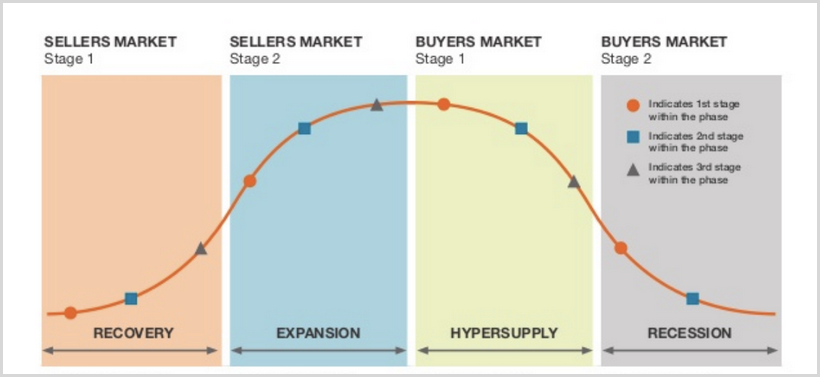The past few weeks and months have been very interesting to see how the global central banks and governments have attempted to position themselves ahead of this COVID-19 virus event. We continue to suggest that we are just starting the process of navigating through this potentially destructive virus event. We believe the sudden onset of the virus pandemic has sent a shock-wave throughout the globe in terms of expectations and valuations that are, just now, starting to become “real”. Let us try to explain our thinking and how this relates to Real Estate.
The COVID-19 virus event is a global crisis event that is currently in the very early stages of consumer psychological processing. All types of crisis events prompt some forms of typical human reaction. We believe the Real Estate market may be the next big asset revaluation event as consumers continue to process the COVID-19 virus crisis and the consequences of this event.
Real Estate Cycles
Real Estate cycles typically transition through the following phases as supply and demand functions work through the markets. Pay attention to the middle of this cycle chart. In the Expansion and HyperSupply stages, once supply peaks and prices somewhat peak/stabilize, a transition takes place in the market where buyers chase premium properties and push price levels moderately higher. The Recession Cycle is typically a disruptive cycle that is the result of an economic/income disruption. When people can’t earn enough to satisfy their debt obligations and or provide for their families, then the Real Estate cycle begins to contract.

An event like this, the COVID-19 virus event, would typically start out as a regional/local event. This did happen as it roiled certain areas of China in late 2019. Watching how China attempted to manage and hide the extent of the virus explosion within their country was painful to watch.
The Chinese state media was pushing out information and numbers which didn’t match anything seen on the streets and being reported by others within China/Hong Kong. This “disconnect” and the misinformation presented within this early virus pandemic event is critical to understanding how the world will now deal with this mess. So, keep in mind, everything was somewhat “clicking right along” in late 2019 and early 2020 as China was fooling the world.
The Chinese New Year celebration fell on January 25, 2020 (Year of the Rat). Near this time in China, hundreds of millions of people travel “back home” to celebrate the New Year with their families and friends. As this travel starts typically 4 to 5 weeks ahead of the date of the New Year, China allowed potentially infected people to travel throughout the world before shutting down travel within China on January 23, 2020. This locked infected and uninfected people into areas within China while the Chinese government began extended efforts to control the virus outbreak.
By early February 2020, the virus had been confirmed in India, Philippines, Russia, Spain, Sweden, the United Kingdom, Australia, Canada, Germany, Japan, Singapore, the US, the UAE, and Vietnam. In essence, the Chinese lock-down presented a very real opportunity for those that had visited China and left to be “locked into location” outside the quarantined areas within China. If they were infected or asymptomatic carriers, these people now became source-spreaders. On February 3, 2020, Chinese President Xi Jinping indicated the Chinese government knew about the virus well before the public alarm was raised – as reported by the Chinese state media.
By Mid February 2020, China had over 40,000 infections and over 900 confirmed deaths related to the COVID-19 virus. Nearly a week later, near February 19, China reported more than 74,000 total cases and 2,100+ deaths. By this time, general global panic had already been set up and this is the point of this article – how consumers respond to a crisis event like a virus pandemic. (Sources: www.aljazeera.com, www.businessinsider.com)
The reason we went through all of this detail is to illustrate how the virus event started as a localized event in China, near the end of 2019. Yet, by early February 2020, less than 35 days later, the virus event suddenly became a global event – panicking the world. The COVID-19 virus event has now turned into a global economic disruption event that has dramatically reduced most people’s ability to earn an income. Businesses and individuals will feel the consequences of this event and we believe the economic contraction is just starting. How do consumers respond to an event like this?
In PART II of this series, we’ll continue to delve into the reasoning behind our research and why we believe the Real Estate market will become very risky for investors over the next 24+ months.
You don’t have to be smart to make money in the stock market, you just need to think differently. That means: we do not equate an “up” market with a “good” market and vi versa – all markets present opportunities to make money!
We believe you can always take what the market gives you, and make a CONSISTENT money.
Learn more by visiting The Technical Traders!
Chris Vermeulen
Technical Traders Ltd.
Disclosure: This article is the opinion of the contributor themselves. The above is a matter of opinion provided for general information purposes only and is not intended as investment advice. This contributor is not receiving compensation for their opinion.

We should devalued our currency
That would take
Care of China .
China should pay for "mistake", blns of dollars
China should pay for it
Excellent article Chris. Would you be interested in talking/writing about an article with the title: "Has Warren Buffett's "Magic Touch" hit a Speed Bump?